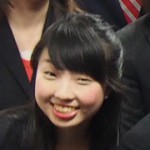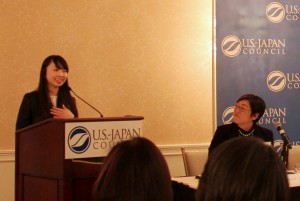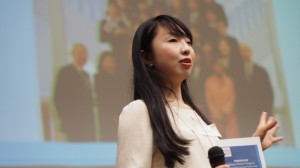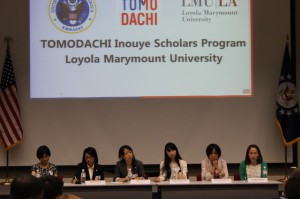TOMODACHI世代:小林明日香

小林明日香(コバヤシ アスカ)さんは現在、慶應義塾大学2年生で政治経済学と法律を勉強しています。小林さんはアメリカで生まれ、3年間過ごしてから日本に帰国しました。彼女はワシントンDCでTOMODACHI世代 プログラム、そして日本ではTOMODACHI MetLife Women’s Leadership Programに参加しました。小林さんは将来仕事を通じて、米国と日本のパートナシップを強化していきたいと考えています。
 「リスクを負うことを恐れなく、良い助言者を見つけ、
「リスクを負うことを恐れなく、良い助言者を見つけ、
このプログラムは、対話、ワークショップ、
ワシントンでの「womenomics」(女性が作り出す経済)
TOMODACHIイノウエ・スカラーズプログラム・パネルディスカッションの参加について、TOMODACHI世代を代表する小林明日香(コバヤシ アスカ)さんが以下のように経験をしました。
 6月27日と7月2日にアメリカ大使館で行われたTOMODACHIイノウエ・スカラーズプログラムんのパネルディスカッションにアルムナイ代表として参加できたことは、大変光栄なことでした。素晴らしい機会を頂けたことをTOMODACHIイニシアチブとアメリカ大使館に感謝申し上げます。パネリストやアメリカの学生から多くの刺激を受けることができた上に、彼らと様々な意見交換をすることで日米関係に関する私自身の視野を広げることができました。
6月27日と7月2日にアメリカ大使館で行われたTOMODACHIイノウエ・スカラーズプログラムんのパネルディスカッションにアルムナイ代表として参加できたことは、大変光栄なことでした。素晴らしい機会を頂けたことをTOMODACHIイニシアチブとアメリカ大使館に感謝申し上げます。パネリストやアメリカの学生から多くの刺激を受けることができた上に、彼らと様々な意見交換をすることで日米関係に関する私自身の視野を広げることができました。
6月27日にはデポール大学の学生と、日本のNGOやNPOの立場について話す機会がありました。多くの日本人がNGOやNPOに重要性を見出さない中、アメリカでは対照的になぜNGOやNPOの社会的地位が高いのかということを、グループディスカッションで話し合いました。アメリカではNGOやNPOでのインターンシップ・ボランティア経験が、良い学校や職に就くために重要視されているそうです。インターンシップ・ボランティア経験を通じて、NGOやNPOは単にボランティア活動をするだけの団体ではなく、社会に対して大きなインパクトを与えているということを、アメリカの学生は理解するということを知りました。このような視点はアメリカの学生の発言がなかったら気付かなかったことです。一人では思いつかなかったことを気付かせてくれるのは、違う文化背景を持った人たちと意見交換することの醍醐味で、その重要性を改めて認識しました。
7月2日にはトモダチ世代の構築プログラムの経験と、大学生から見た日本の女性に関する課題についてロヨラ・メリーマウント大学の学生たちと話す機会がありました。ロヨラ・メリーマウント大学の学生の一人がレイプに遭った経験を話してくれ、日本での性犯罪の実体や日本政府がどのようにその問題に取り組んでいるのかと質問しました。しかし驚いたことに、彼女の質問にたいしてパネリストの誰一人としてしっかりとした答えを述べることができなかったのです。日本政府がどのように性犯罪問題に取り組んでいるかを誰も知らなかったという事実こそ、人々の間でこの問題に対する認識がいかに低いかということを物語っています。アメリカの学生と話し合う中で、女性の地位に関する課題が日本にどれだけ山積しているかということに気付かされました。
 このような経験を通して、文化交流の中でもとりわけ日米間交流の重要性を痛感しました。意見交換で互いの国の強みを学び、自国に持ち帰って役立てることもできます。自国について全く違う視点からの意見を聞くことは、視野を広げたり、課題に対する新たな解決策のアイディアを思いついたり、今まで気付かなかった社会問題に新たに目を向けることにつながります。この経験を通して、自分が日本について知らないことがいかに多いかということにも気づきました。これを機会に日本についてさらに見識を深めて、自分の国について尋ねられた際にはしっかりと意見を言えるようになりたいと思っています。
このような経験を通して、文化交流の中でもとりわけ日米間交流の重要性を痛感しました。意見交換で互いの国の強みを学び、自国に持ち帰って役立てることもできます。自国について全く違う視点からの意見を聞くことは、視野を広げたり、課題に対する新たな解決策のアイディアを思いついたり、今まで気付かなかった社会問題に新たに目を向けることにつながります。この経験を通して、自分が日本について知らないことがいかに多いかということにも気づきました。これを機会に日本についてさらに見識を深めて、自分の国について尋ねられた際にはしっかりと意見を言えるようになりたいと思っています。
この二つのパネルディスカッションを通じて、直接顔を合わせてのコミュニケーションや意見交換することの大切さを痛感しました。二国間交流を続けていくことこそが、将来のより良い日米関係につながると強く信じています。


